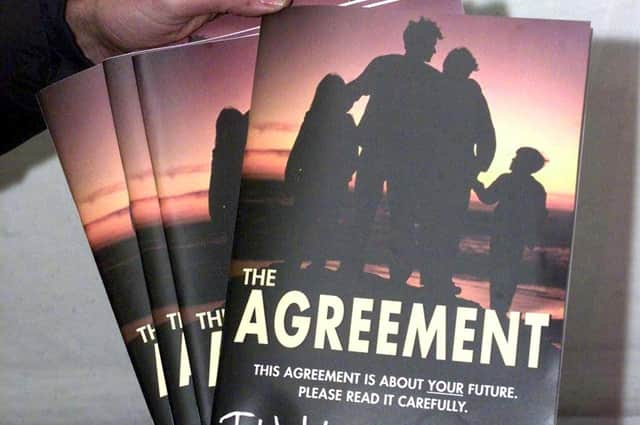DUP MP: Critics of our party are wrong about designation link to first minister


The legendary US Senator Daniel Patrick Moynihan, famously once said “Everyone is entitled to his own opinion, but not to his own facts.”
Twice in recent days your paper has published comments from those who seem to think they are entitled to their own facts.
Advertisement
Hide AdAdvertisement
Hide AdIn your May 10 edition former Green Party MLA, Brian Wilson wrote (see link below): “Under the Belfast/Good Friday Agreement (GFA) the DUP would have had the responsibility of appointing the first minister. This responsibility was given to the largest party from the largest designation. This would have been the DUP as the largest unionist party.”


Not to be outdone, in your May 12 edition former Ulster Unionist leader, Lord Empey stated (see link below): “Under the rules negotiated in the Belfast/Good Friday Agreement, the first minister was to come from the largest party in the largest designation (either unionist or nationalist) and the deputy first minister from the largest party in the next largest designation (either unionist or nationalist).”
Both of these statements are clear and unambiguous. They seek to state the position as legal fact not informal convention. However, neither of these statements is correct.
I say that not as an opinion but to simply correct the record.
Advertisement
Hide AdAdvertisement
Hide AdParagraph 15 of Strand One of the Belfast Agreement stated, “The First Minister and Deputy First Minister shall be jointly elected into office by the Assembly voting on a cross-community basis, according to 5(d)(i) above.”
Paragraph 5(d)(i) stated, “parallel consent, i.e. a majority of those members present and voting, including a majority of the unionist and nationalist designations present and voting”.
This was then incorporated in law in section 16 (3) of the Northern Ireland Act which stated, “Two candidates standing jointly shall not be elected to the two offices without the support of a majority of the members voting in the election, a majority of the designated Nationalists voting and a majority of the designated Unionists voting.”
One does not need to be a lawyer to realise that there is no mention of parties whatsoever in either text.
Advertisement
Hide AdAdvertisement
Hide AdNeither is there anything implicit in these arrangements that any particular party from any designation would take either post.
Though unionism remains the largest designation in the assembly it seems unrealistic to imagine that Sinn Fein having won both more votes and more seats in an election would have been content to fill the deputy first minister’s position.
It is particularly disappointing that Lord Empey, as someone who played a leading role in negotiating the agreement seems oblivious to its terms.
Carla Lockhart, DUP MP, Upper Bann
• Lord Empey May 12: The DUP have no-one to blame but themselves for disastrous election
Advertisement
Hide AdAdvertisement
Hide Ad• Brian Wilson letter May 10: DUP would have first minister post if they hadn’t sought Stormont process change
• Other commentary:
• Ben Lowry May 14: Here are six of the broad reasons for the recent turn against unionism, some of which are reversible
Advertisement
Hide AdAdvertisement
Hide Ad• Editorial May 14: Crowds of all ages flock to Balmoral to savour a normal show
• Nigel Dodds May 13: Reg Empey is attacking other unionists when voters want a united approach
• Samuel Morrison May 13: The TUV got 8% of the vote in Northern Ireland and can no longer be ignored
• Editorial May 13: The NIO has been right to send a minister to US amid American pressure on UK
Advertisement
Hide AdAdvertisement
Hide Ad• Peter Robinson May 11: Ignore those who are urging DUP to just go back into Stormont
• John Cushnahan May 11: SF hypocrisy to attack DUP leader over MP seat while boycotting Westminster
• Ben Lowry May 9: The TUV vote surge should have been one of the main stories of the election
• Ben Lowry May 7: Unionism now faces a considerable challenge in how to go forward
• Ben Lowry May 7: Unionist overall vote stays ahead of nationalist total, albeit narrowly